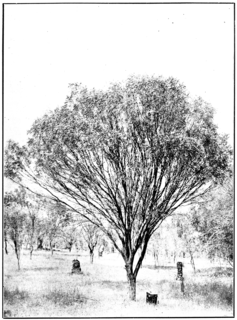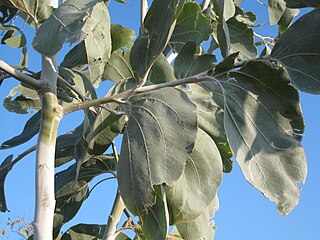
Acacia cultriformis, known as the knife-leaf wattle, dogtooth wattle, half-moon wattle or golden-glow wattle, is a perennial tree or shrub of the genus Acacia native to Australia. It is widely cultivated, and has been found to have naturalised in Asia, Africa, North America, New Zealand and South America. A. cultriformis grows to a height of about 4 m (13 ft) and has triangle-shaped phyllodes. The yellow flowers appear from August to November in its natural range. Its attractive foliage and bright flowers make it a popular garden plant.

Acacia acuminata, known as mangart and jam, is a tree in the family Fabaceae. Endemic to Western Australia, it occurs throughout the south west of the State. It is common in the Wheatbelt, and also extends into the semi-arid interior.

Acacia quadrimarginea, commonly known as granite wattle or spreading wattle, is a tree in the family Mimosaceae. Endemic to Western Australia, it occurs through arid south-central Western Australia. It is common on granite, but also occurs on sand and clay, and is often seen along creeklines in rocky hills.

Acacia, commonly known as the wattles or acacias, is a large genus of shrubs and trees in the subfamily Mimosoideae of the pea family Fabaceae. Initially, it comprised a group of plant species native to Angola and Australasia. The genus name is New Latin, borrowed from the Greek ἀκακία, a term used by Dioscorides for a preparation extracted from the leaves and fruit pods of Vachellia nilotica, the original type of the genus. In his Pinax (1623), Gaspard Bauhin mentioned the Greek ἀκακία from Dioscorides as the origin of the Latin name.

Carl Daniel Friedrich Meissner was a Swiss botanist.

Acacia plicata is a species of wattle which is endemic to an area between Perth and Geraldton in Western Australia.

Acacia concurrens, commonly known as curracabah or black wattle, is a shrub native to Queensland in eastern Australia.

Acacia prominens is a shrub or tree in the genus Acacia native to New South Wales, Australia.

Acacia argyrodendron, known colloquially as black gidyea or blackwood, is a species of Acacia native to Australia. Czech botanist Karel Domin described this species in 1926 and it still bears its original name. Domin reported collecting the type specimen from somewhere between Camooweal and Burketown in northwestern Queensland, though it is more likely to have been northeast of Aramac.

Acacia loderi, known colloquially as nelia or nealie, is a species of Acacia native to Australia.

Lampetis fastuosa is a jewel beetle of the family Buprestidae.

Acacia demissa is a species of Acacia native to an area of Western Australia inland of Shark Bay. It grows as a shrub or small tree, reaching 1.5–4 metres tall. It is closely related to A. quadrimarginea, with which it may hybridise.

Acacia fulva, known colloquially as velvet wattle or soft wattle, is a species of Acacia native to eastern Australia.

Acacia leiophylla, commonly known as coast golden wattle, is a tree of the family Mimosaceae native to South Australia and Western Australia.

Acacia anomala, commonly known as grass wattle is a shrub belonging to the genus Acacia. It is native to a small area along the west coast of Western Australia, and is listed as a vulnerable species under the Western Australian Wildlife Conservation Act and the Commonwealth Environmental Protection Act.

Acacia nervosa, commonly known as rib wattleribbed wattle or perfumed wattle, is a shrub belonging to the genus Acacia and the subgenus Phyllodineae.

Acacia dunnii, commonly known as elephant ear wattle or Dunn's wattle, is a shrub or tree of the genus Acacia and the subgenus Plurinerves.

Acacia trinalis is a shrub or tree of the genus Acacia and the subgenus Plurinerves that is endemic to an area of south western Australia.

Mulga is a type of habitat composed of woodland or open forest dominated by the mulga tree, Acacia aneura, or similar species of Acacia.
Dereodus mastos, is a species of weevil found in India, Sri Lanka and introduced to Australia.


















